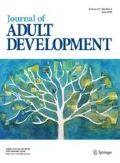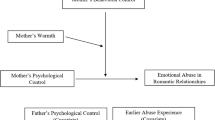Abstract
Based on attachment, socialization, and social learning theories, it was hypothesized that fathers’ parenting style and fathers’ specific behaviors would be related to emerging adults’ romantic relationship quality. These hypotheses were partially supported. Hierarchical regression analyses examined one hundred twenty-eight 18- and 19-year-olds in romantic relationships. For males, more paternal warmth and less psychological control were related to more support in a romantic relationship. For both males and females, more psychological control was related to more relationship conflict. Additionally, for males, perceptions of better paternal attentiveness, praise and affection, time and talking, mother support, and school encouragement were related to more relationship support, as was more global father involvement. Perceptions of better attentiveness and school encouragement were related to more depth in romantic relationships for males. The original 9-factor structure of Hawkins et al.’s (J Men’s Stud 10:183–196, 2002) Inventory of Father Involvement was not confirmed for offspring reports. However, an 8-factor structure with one second-order factor was supported.
Similar content being viewed by others
References
Ainsworth, M. D. S., & Bowlby, J. (1991). An ethological approach to personality development. American Psychologist, 46, 333–341. doi:10.1037//0003-066X.46.4.333.
Bandura, A. (1978). The self system in reciprocal determinism. American Psychologist, 33, 344–358.
Baumrind, D. (1991). Parenting styles and adolescent development. In R. M. Lerner, A. C. Petersen, & J. Brooks-Gunn (Eds.), Encyclopedia of adolescence (Vol. 2, pp. 746–758). New York: Garland Publishing.
Cabrera, N. J., Tamis-LeMonda, C. S., Bradley, R. H., Hofferth, S., & Lamb, M. E. (2000). Fatherhood in the twenty-first century. Child Development, 71, 127–136. doi:10.1111/1467-8624.00126.
Conger, R. D., Cui, M., Bryant, C. M., & Elder, G. H, Jr. (2000). Competence in early adult romantic relationships: A developmental perspective on family influences. Journal of Personality and Social Psychology, 79, 224–237. doi:10.1037//0022-3514.79.2.224.
De Goede, I. H. A., Branje, S., van Duin, J., VanderValk, I. E., & Meeus, W. (2012). Romantic relationship commitment and its linkage with commitment to parents and friends during adolescence. Social Development, 21, 425–442. doi:10.1111/j.1467-9507.2011.00633.x.
Donnellan, M. B., Larsen-Rife, D., & Conger, R. D. (2005). Personality, family history, and competence in early adult romantic relationships. Journal of Personality and Social Psychology, 88, 562–576. doi:10.1037/0022-3514.88.3.562.
Feldman, S. S., Gowen, L. K., & Fisher, L. (1998). Family relationships and gender as predictors of romantic intimacy in young adults: A longitudinal study. Journal of Research on Adolescence, 8, 263–286. doi:10.1207/s15327795jra0802_5.
Fite, J. E., Bates, J. E., Holtzworth-Munroe, A., Dodge, K. A., Nay, S. Y., & Pettit, G. S. (2008). Social information processing mediates the intergenerational transmission of aggressiveness in romantic relationships. Journal of Family Psychology, 22, 367–376. doi:10.1037/0893-3200.22.3.367.
Flouri, E., & Buchanan, A. (2002). What predicts good relationships with parents in adolescence and partners in adult life: Findings from the 1958 British birth cohort. Journal of Family Psychology, 16, 186–198. doi:10.1037/0893-3200.16.2.186.
Furman, W., & Buhrmester, D. (1985). Children’s perceptions of the personal relationships in their social networks. Developmental Psychology, 21, 1016–1024.
Hawkins, A. J., Bradford, K. P., Palkovitz, R., Christiansen, S. L., Day, R. D., & Call, V. R. A. (2002). The inventory of father involvement: A pilot study of a new measure of father involvement. The Journal of Men’s Studies, 10, 183–196. doi:10.3149/jms.1002.183.
James, J., Ellis, B. J., Schlomer, G. L., & Garber, J. (2012). Sex-specific pathways to early puberty, sexual debut, and sexual risk taking: Tests of an integrated evolutionary–developmental model. Developmental Psychology, 48, 687–702. doi:10.1037/a0026427.
Kim, E. J., Conger, R. D., Lorenz, F. O., & Elder, G. H, Jr. (2001). Parent-adolescent reciprocity in negative affect and its relations to early adult social development. Developmental Psychology, 37, 775–790. doi:10.1037/0012-1649.37.6.775.
Kim, H. Y., Pears, K. C., Capaldi, D. M., & Owen, L. D. (2009). Emotion disregulation in the intergenerational transmission of romantic relationship conflict. Journal of Family Psychology, 23, 585–595. doi:10.1037/a0015935.
Kline, R. B. (2005). Principles and practice of structural equation modeling (2nd ed.). New York: The Guilford Press.
Maccoby, E. E., & Martin, J. (1983). Socialization in the context of the family: Parent–child interaction. In E. M. Hetherington (Ed.), Handbook of child psychology: Vol 4. Socialization, personality, and social development (4th ed., pp. 1–101). New York: Wiley.
Margolies, P. J., & Weintraub, S. (1977). The revised 56-item CRPBI as a research instrument: Reliability and factor structure. Journal of Clinical Psychology, 33, 472–476.
Marsiglio, W., Day, R. D., & Lamb, M. E. (2000). Exploring fatherhood diversity: Implications for conceptualizing father involvement. Marriage & Family Review, 29, 269–293. doi:10.1300/J002v29n04_03.
Palkovitz, R. (2002). Involved fathering and child development: Advancing our understanding of good fathering. In C. S. Tamis-LeMonda & N. Cabrera (Eds.), Handbook of father involvement: Multidisciplinary perspectives (pp. 119–140). Mahwah, NJ: Lawrence Erlbaum Associates.
Pierce, G. R., Sarason, I. G., & Sarason, B. R. (1991). General and relationship-based perceptions of social support: Are two constructs better than one? Journal of Personality and Social Psychology, 61, 1028–1039. doi:10.1037/0022-3514.61.6.1028.
Schaefer, E. S. (1965). Children’s reports of parental behavior: An inventory. Child Development, 36, 413–424. doi:10.2307/1126465.
Schludermann, E., & Schludermann, S. (1970). Replicability of factors in children’s report of parent behavior (CRPBI). The Journal of Psychology, 76, 239–249. doi:10.1080/00223980.1970.9916845.
Schludermann, S., & Schludermann, E. (1983). Sociocultural change and adolescents’ perceptions of parent behavior. Developmental Psychology, 19, 674–685. doi:10.1037/0012-1649.19.5.674.
Seiffge-Krenke, I., Shulman, S., & Klessinger, N. (2001). Adolescent precursors of romantic relationships in young adulthood. Journal of Social and Personal Relationships, 18, 327–346. doi:10.1177/0265407501183002.
Stocker, C. M., & Richmond, M. K. (2007). Longitudinal associations between hostility in adolescents’ family relationships and friendships and hostility in their romantic relationships. Journal of Family Psychology, 21, 490–497. doi:10.1037/0893-3200.21.3.490.
Verhofstadt, L. L., Buysse, A., Rosseel, Y., & Penne, O. J. (2006). Confirming the three-factor structure of the Quality of Relationships Inventory within couples. Psychological Assessment, 18, 15–21. doi:10.1037/1040-3590.18.1.15.
Whitton, S. W., Waldinger, R. J., Schulz, M. S., Allen, J. P., Crowell, J. A., & Hauser, S. T. (2008). Prospective associations from family-of-origin interactions to adult marital interactions and relationship adjustment. Journal of Family Psychology, 22, 274–286. doi:10.1037/0893-3200.22.2.274.
Author information
Authors and Affiliations
Corresponding author
Rights and permissions
About this article
Cite this article
Karre, J.K. Fathering Behavior and Emerging Adult Romantic Relationship Quality: Individual and Constellations of Behavior. J Adult Dev 22, 148–158 (2015). https://doi.org/10.1007/s10804-015-9208-3
Published:
Issue Date:
DOI: https://doi.org/10.1007/s10804-015-9208-3




